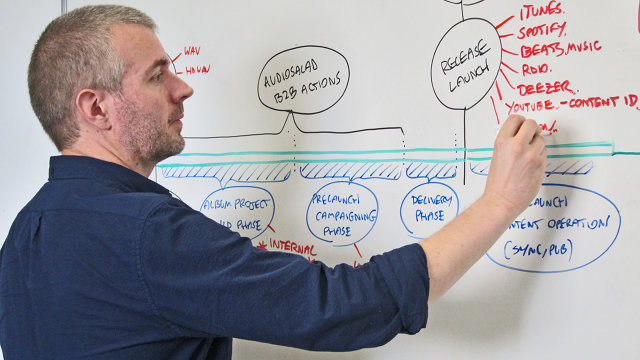When Iain Catling relocated from his native England to New York City, his first new friend was Deane Thomas. They met at a bar a few days after he arrived in the city and "found that we shared a common passion for music and technology." That led to a lot of concerts and going out to buy music--back in the "old days" of record shops and Virgin megastores--and even testing out a new invention together: "We were at the front of the queue when iPods came out!" Catling remembers.

As the very rules of how music distribution shifted from physical products to digital files, they wanted to be a part of this groundswell of change. "In 2007, we found ourselves talking at great length about tech, music, the intersection of the two, and the changes the music industry was going through," says Catling, a house music fan who was working in software development and finance on Wall Street at the time. Those conversations were the beginning of AudioSalad, a content-management platform for music labels and artists. "Initially, we worked with labels to create their own digital storefronts to sell their content (alongside iTunes) and offer exclusive releases to their fans," he explains. It was a boutique experience compared to the mega-mall feeling of mass online music shops. However, it soon became clear that what these labels needed went well beyond software that would manage a digital store. Says Catling: "They needed a solution to quickly leverage their assets."

In other words, just at the time that labels were making less money, thanks to people being able to illegally download music for free, they needed to spend more money to learn how to be tech savvy. Tasks like creating spreadsheets, setting print resolution for artwork, transcoding file formats, assigning metadata, and uploading content to distributors like iTunes suddenly became critical to success--and were exactly what Catling and Thomas, who also had a background in tech, could provide. So AudioSalad shifted its approach to meet the demands of its clients. "Today, AudioSalad offers a centralized repository for their asset and metadata storage," says Catling, explaining that "we spent a significant amount of time developing the platform along with input from some of our key clients--it is now a complex piece of software offered as a cloud based service."
One client that proves the success of their model early on is indie label Domino Records, the musical home of many popular bands including Arctic Monkeys and Franz Ferdinand. "It took six months working quite intensely with them to get everything into great shape," says Catling. "But once they reached that point where the catalogue was perfectly organized, they were poised to utilize and monetize their catalogue better than most other indie labels out there."
This ability to combine great music with innovative technology is what continues to motivate AudioSalad. "The name comes from the audio-centric intermix of content and functionality, like a good salad," says Catling. The company works with more than 60 third-party services, including iTunes, Google, and Shopify, and boasts clients including soul music powerhouse Daptone Records. As AudioSalad grows, so too does the profit margin for the labels and independent artists with whom they work. "Things we are able to build today with a small team were out of reach [technologically] just a decade ago," says Catling. Which means that thanks to AudioSalad, the music industry may be finding the happily ever after that once seemed out of grasp.